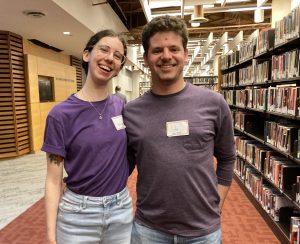The media are responsible, at least in part, for exacerbating the trauma many Israelis and others suffer from exposure to terrorism and war, an expert on the emotional impact of terrorism says.
“The media’s tendency to rebroadcast a terrorist attack over and over again along with reporting many false rumours worsens the trauma and sense of fear that many people feel in the aftermath of a terrorist attack,” Solly Dreman, a professor emeritus in the department of psychology at Ben-Gurion University of the Negev told a Winnipeg audience at Temple Shalom on Feb. 9.
Speaking on the topic “Psychological Impact of War and Terrorism” along with two others – Edith Kimelman, a child Holocaust survivor, and Michelle Strain, a refugee response co-ordinator – Winnipeg-born Dreman, 77, cited for example the media’s blanket coverage with raising the fear level higher than it needed to be.
READ: AMID TERROR AND ANTI-SEMITISM, A LESSON FROM THE HOLOCAUST
“The media needs to cool it,” he said. “While it is important to report the news and keep people informed, updates every four or five hours instead of continuous coverage would help calm the situation.”
On behalf of the advocacy group Winnipeg Friends of Israel (one of the evening’s sponsors along with Temple Shalom, the Jewish Post and News and the Winnipeg branch of the Canadian Associates of Ben-Gurion University), Yolanda Papini-Pollock added that Israelis, currently suffering through the “knife intifadah,” have had more experience than most in dealing with war- and terror-related trauma.
Israeli-born and raised, Papini-Pollock noted that Israelis do their best to live normal lives despite the fact that many have suffered some emotional damage through the experience of war or losing a loved one or friend to terrorist violence.
Dreman spoke about two families he counselled who were traumatized by terror. In both cases, two young children lost parents in a terrorist attack – a father in one and both parents in another. In the second attack, the children watched their parents die.
In both cases, Dreman noted, counselling seemed to help the children and the surviving mother to return to normal lives.
“Long term though, our counselling failed,” he said. “Following up 10 years later, we found that the two children who were orphaned were involved in criminal activity [one was involved in a robbery at a museum] and drugs, while the boy in the other family became anorexic and was a compulsive worrier, and the girl had psychological difficulties brought on by having been called to serve in the army.”
Although the widowed mother did remarry, he said, the marriage didn’t last, in part because of the government’s compensation rules. On remarrying, she lost her generous compensation benefits as the widow of a terror victim and her second husband was unable to financially support the family.
In dealing with trauma as a result of violence, Dreman emphasized the importance of having a social support network, maintaining a normal routine (especially for children), trying not to over-protect children and having parents encourage their children to express their fears, suggestions that the other two speakers agreed with.
Kimelman spoke of her lifelong nightmares and anxiety from her experiences during the Holocaust and her fears for the safety of her own three sons. After coming to Winnipeg at the age of 14 with other surviving family members, however, she said, she was able to complete her education and enjoy a successful career as a teacher and principal in the Jewish school system in Winnipeg.
Strain, a Manitoba Immigrant and Refugee Settlement Sector Association refugee response co-ordinator with the Salvation Army, talked about Manitoba’s resettlement efforts on behalf of Syrian refugees.
READ: AFTER THE TERROR – ISRAEL’S EMERGENCY WORKERS
“Manitoba has pledged to welcome about 2,000 Syrian refugees,” she said. “The refugees that are coming here are among the most vulnerable. They are large families from poor areas of Syria. They have had limited education. The children received no schooling in the refugee camps. Housing in particular is a major problem.”
But Manitoba has had a lot of experience integrating refugees from war-torn countries, she said. “The key to successful integration is a helping hand, helping the refugees to learn English, find work and become part of a community.”
She cited the example of one young woman who was separated from her family during an attack on her village in Africa. She spent several years living in the jungle and came to Winnipeg with no English, limited education and two small children.
“At first, she rarely left her home,” Strain said. “We got her into a program and she blossomed. She got a job, became a manager where she works and became a homeowner. She has built a wonderful life for herself and her children.
“That resiliency is common to most of the refugees that I have worked with.”






